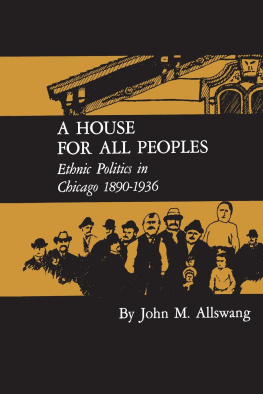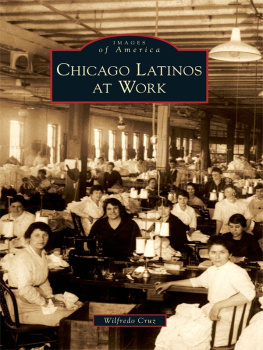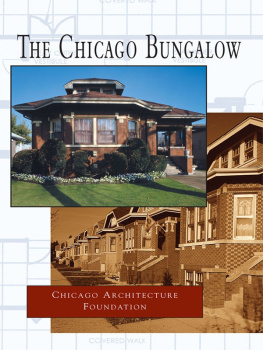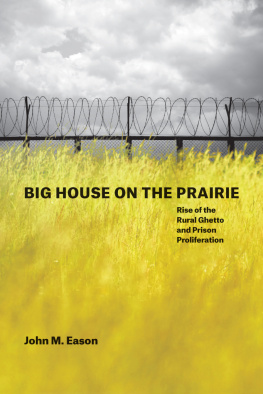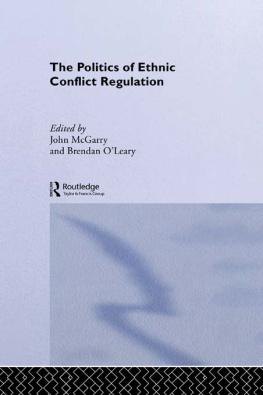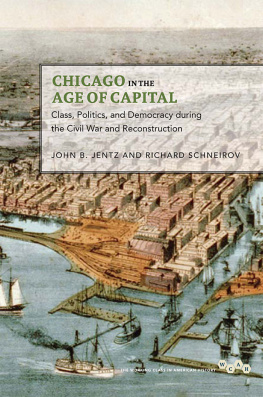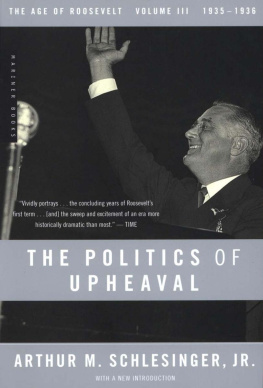A House for all Peoples
A House for all Peoples
ETHNIC POLITICS IN CHICAGO 1890-1936
John M. Allswang
ISBN 978-0-8131-5098-7
Library of Congress Catalog Card Number: 76119810
Copyright 1971 by The University Press of Kentucky
A statewide cooperative scholarly publishing agency
serving Berea College, Centre College of Kentucky,
Eastern Kentucky University, Kentucky State College,
Morehead State University, Murray State University,
University of Kentucky, University of Louisville,
and Western Kentucky University.
Editorial and Sales Offices: Lexington, Kentucky 40506
for
my father,
of blessed memory,
and my mother
Contents
Preface
In this book I am trying to investigate the relationship between ethnic pluralism and American politics in an era of political and social change. The study has been worked out over a lengthy period of time, in several stages. Where I originally sought to inquire into a limited area of political analysis and a small number of elections, I have found myself being pushed into a steadily expanding period of time and a wide variety of interrelated sociopolitical and intellectual problems. During the course of this intellectual voyage my conception of the problem has changed considerably; new questions have supplanted older ones. Similarly, new methods and tools have been required to deal adequately with the complexities of the problem.
The analysis of political behavior seems particularly suited to quantitative analytical techniques. The methodological discussion in the Appendix will explain how I have endeavored to build quantitative models for description and analysis. Hopefully a reasonable balance has been struck between the number and the word, with the strengths and weaknesses of each being duly recognized. Certainly the myriad forces involved in mass political behavior in a democratic society require all the analytical devices and insights the historian can bring to them.
Throughout my work I have had the sage counsel of Prof. Samuel P. Hays of the University of Pittsburgh; he has shared with me his shrewd critical insights into specific problems and into historical inquiry generally, and I am most grateful to him. I have also been greatly assisted by the substantive and methodological work of a generation of social scientists, a debt inadequately expressed in the impersonality of footnotes.
I am grateful also to Profs. Richard Jensen of Washington University and Robert Zemsky of the University of Pennsylvania for their effective presentation of insights into the handling of quantitative techniques in history at the 1968 summer program of the Inter-University Consortium for Political Research at Ann Arbor. Despite these and other debts, remembered and forgotten, the responsibility for the substance and method of the study is of course my own.
I would like to thank the following institutions for the facilities and assistance made available to me: the Chicago Historical Society, the Newberry library, the American Jewish Archives, the Midwest Interlibrary Center, the University of Chicago libraries, the Roosevelt University library, the Northern Michigan University library, the library of the National Opinion Research Center, and the Johnson Publishing Company. The Board of Election Commissioners of the City of Chicago, and particularly its warehouse staff, were especially hospitable to my burdensome needs on a number of occasions. And the Department of Economics of California State CollegeLos Angeles generously made available for my use its Underwood-Olivetti Programma desktop computer.
My wife, Suzanne, has devoted hundreds of hours to this study, in recording countless election returns, calculating endless percentages, helping with the preparation of graphs and tables, proofreading, and relocating data which I was sure was lost forever. Additionally, she has rendered those intangible assistances which are so essential to sanity amidst scholarship; without her this book would not have been completed. My daughter, Eden, contributed her smile.
Part One
Ethnic Politics
18901936
I. Ethnic Groups & Their Politics
This book comprises a study of the political behavior of the ethnic groups of a major American city from 1890 to 1936. More specifically, it centers on the role of those groups in the rise to unprecedented power of the Democratic party in Chicago. Thus emphasis will be placed on the period from the end of World War I to the first Roosevelt election.
The central questions will be: what was the role of ethnic groups in Chicagos politics, and to what extent was the changing political balance of power attributable to their political behavior? I shall first be concerned with describing ethnic political behavior, and then with uncovering the reasons behind it.
In the course of the inquiry, a number of ancillary questions will also arise. How do ethnic groups make their way into the American political system and into American society generally? What is the key to party and leadership success in the politics of a pluralistic society? What kinds of issues mean the most to American voters? Are local, state, and national politics one, or separate? What are the dynamics of political relationships and are they one-way or reciprocal? Do American political parties have discoverable ideologies or self-conceptions?
A number of methodological questions will also arise. How are political relationships to be understood? How easily determined is the apparently simple question: to which party does a group of people belong? What are the best tools for analyzing political history? Which among a group of variables is most important in the only partly rational phenomenon called political behavior?
The role of urban ethnic groups in bringing about the revival of the national Democratic party by the early 1930s has been appreciated by many historians. Only since they have begun to employ new methods, however, have the origins and extent of this role begun really to be understood. Samuel Lubell, in his pace-setting The Future of American Politics, studied the political behavior of American counties and cities and used their demographic variations to explain political development. He pointed to the 1928 election as the great turning point in the revival of the Democratic party.
The tools of social science have been central to this more careful understanding of the role of groups in the American political process. These tools have been important in two ways. First, they can be employed in historical analysis, providing more complete and more definite information than was previously available. The use of quantification was a first step, and one that is still being taken.
This study attempts to analyze political development through a combination of quantitative and qualitative techniques. Its statistics and methodology are elementary and technically simple, which well suits the complexities of political relationships. Conceptually, the method is somewhat more ambitious, since it employs theories of social science which have remained largely unapplied. It assumes that the historian is fortunate in his straddling of the humanities and the social sciences, being able to take from each that which best suits his particular area of analysis. If this appeals to neither determined methodologists nor implacable traditionalists, it nonetheless seems ideal for studying the sometimes rational, sometimes irrational, and always complex dynamics of historical development.


